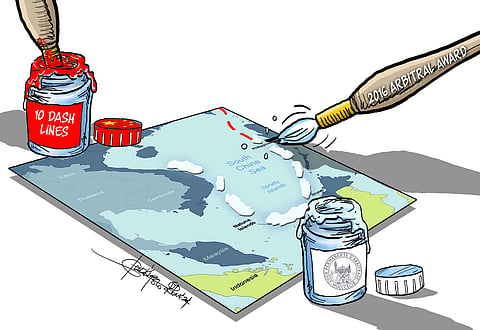
- NEWS
- the EDIT
- COMMENTARY
- BUSINESS
- LIFE
- SHOW
- ACTION
- GLOBAL GOALS
- SNAPS
- DYARYO TIRADA
- MORE

The Philippines established a clear position on the territorial conflict in the West Philippine Sea through the address of President Ferdinand “Bongbong” Marcos Jr. at the recent Asia Security Summit in Singapore.
The definition of the Philippine boundaries countered the 10-dash line claim of China and provided its successors with a clear position in defense of the Philippine claim.
Marcos raised for the first time on the global stage the position that the Philippine territory is regulated by the Treaty of Paris between Spain and the United States as amplified, clarified, and amended by the 1900 Treaty of Washington.
More than anything else, Singapore was a pushback to the falsehoods being spread lately.
China has propagated the rewriting of history and international law about the South China Sea. Its claims of historic rights have been debunked by both scholars and the 2016 ruling of the Permanent Court of Arbitration.
Among its fabrications included the alleged Philippine government promise to remove the beached BRP Sierra Madre from Ayungin Shoal. While China had previously raised this claim in 2014 and 2016, its repetition in August 2023 appeared to cause genuine confusion and surprise in Manila. China, nonetheless, never provided evidence for this claim.
Beijing also persistently raised the existence of a “gentleman’s agreement” made by the former Duterte administration. The supposed agreement was a quid pro quo, whereby China would allow the resupply of the Sierra Madre as long as the Philippines did not repair or reinforce the vessel.
More recently China claims to have an audio recording and transcript of a phone call between a Chinese diplomat and a senior officer in the Armed Forces of the Philippines in which the two agreed to a “new model” for resupplying the Sierra Madre.
The supposed transcript was then presented exclusively to China’s friendly media outlets.
The overarching theme was that the Philippines had not honored its “commitments” and went against “consensus” and that it was the mischievous party and the source of provocation.
The Philippines was, however, consistent in its narrative of being committed to international law.
Retired Associate Justice Antonio Carpio said Marcos countered the “greatest misconception” peddled by China regarding the territorial rift.
“This is the first time that a Philippine President has stated that Philippine territory is defined by the 1898 Treaty of Paris, as clarified by the 1900 Treaty of Washington, which stated that Philippine territory includes all islands of the Philippine archipelago lying outside the lines of the Treaty of Paris,” Carpio said.
“This is factually, legally, and historically correct,” Carpio indicated. “When we established our Commonwealth in 1935, we put together a constitution that defined our territory by the international treaties that became the basis of our archipelagic unity,” Marcos said in the Singapore forum.
“The Treaty of Paris between Spain and the United States crystallized our islands into a cohesive whole. The Treaty of Washington clarified (that) the extent of our sovereignty and (our) patrimony (transcends the) lines set by international powers.”
In the Treaty of Washington, Spain relinquished to the United States all title to any and all islands belonging to the Philippine archipelago, including those lying outside the lines defined in the Treaty of Paris, particularly the islands of Cagayan, Sulu, and Sibutu and their dependencies.
“This finally corrects the greatest misconception in Philippine history that Philippine territory is limited to the islands within the Paris Treaty lines. A watershed moment in our fight to defend our island territories and maritime zones in the West Philippine Sea,” he said.
China has been referring to the Paris treaty as having not included many of the features that the Philippines said were inside its territory.
The strongest defense remains the 2016 arbitral award that said China’s 10-dash line does not exist and that the Philippines is entitled to its exclusive economic zone where most of the Chinese harassment is happening.
Countering the repeated deceptions with facts has prevented Beijing’s lies from being recognized as truth in the ongoing standoff.
